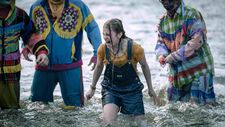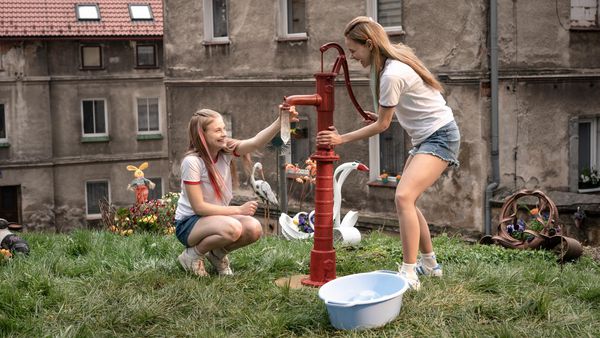Line producer Luiza Skrzek believes that Mytnik’s feature debut required serious preparation. She wanted to make sure that there was always a psychologist on set, ready to assist teenage actors Julia Polaczek, Nel Kaczmarek and Weronika Kozakowska. Her extensive background in production management and her devotion to the production process ensured the successful development of the film, which is premiering at the 40th Warsaw Film Festival.
 |
| Justyna Mytnik: 'For me, the most important part was the emphasis on working with actors and having rehearsals' Photo: Courtesy of Warsaw Film Festival |
…you shifted from theatre to cinema. Would you say that your background in theatre influenced your approach to filmmaking?
Justyna Mytnik: It definitely did. For me, the most important part was the emphasis on working with actors and having rehearsals. That's something my producer Marta Gmosinska was surprised to hear – how much I wanted to rehearse with my actors. And another thing: how much I talked about the script. In fact, I changed it for the actors – who were quite young – because we cast them two years before the actual shoot. I’m not a stranger to rework. While I was writing theatre in Scotland, I was also rewriting for actors. What fascinates me about this part of my work is the collaborative element.
Speaking of collaboration, what was it like to prepare the script with two other co-writers?
JM: It actually wasn’t my intention. I have previously collaborated with Rosanna Hall, one of the other scriptwriters, as part of a theatre festival. Having exclusively worked in theatre, she found it hard to keep on working on something for so long, as she was used to being done with a project within a year or two. In contrast, Wet Monday took eight years to finish – seven years of production and one year of post-production and promotion.
In the meantime she moved to Canada so two years before we started filming, Monika Dembińska was added to the team.
You already mentioned your work process with actors. Considering the complexity of the subject of abuse, which problems have you encountered during filming – especially with teenage actors?
JM: We felt that we were well-prepared for this, but of course, it’s a challenge to work with many debutants, not only actresses, but also producers, director, and a sound designer. You have to change your mindset a bit and figure out how to deal with those obstacles on set.
In a way, I believed that the topic of the film was too difficult for a teenager to understand and actually perform, so I was initially against casting people under 20. It was our casting director who advised that we try with amateurs. As soon as I met then-15-year-old Julia, I decided instantaneously that I wanted her to play the main role.
 |
| Justyna Mytnik: 'I wanted to merge these good memories of Wet Monday with a dark theme' Photo: Courtesy of Warsaw Film Festival |
JM: They were looking around the set excited, as if it were a geeky relic of the past. I think they had fun with it. I had told the designers that the film takes place around 2005. Being super specific was not the bottom line because to me, the most important thing is that it's a story that happened, “not so long time ago, in the city, just like any other”.
What were the influences for the fantasy scenes?
JM: Using the rabbit as a symbol is inspired both by Angela Carter’s works and from Celtic myths. Legend has it that the goddess Ostara turned a hen into a rabbit, and that's why the rabbit brings eggs at Easter. I merged her with Marzanna, a pagan Slavic goddess of spring and rebirth. Fantasy films are generally overlooked when talking about “serious cinema”. It is difficult to categorize Wet Monday strictly as a genre film, but it certainly contains some fantasy elements.
Luiza, as a producer, what made you decide to join such a project?
Luiza Skrzek: Years ago, I decided that I would like to work with independent cinema. Of course, we knew that it will be difficult to find the right target. We decided to do it anyway because we believe in the importance of this story.
Was the decision to set the film around the Wet Monday tradition based on a memory of yours?
JM: I didn’t experience the costume celebrations first hand. However, I spent Easter in a region of Poland where Wet Monday is celebrated similarly. I vividly remember everyone running around like crazy pouring water on each other, soaking wet. I wanted to merge these good memories of Wet Monday with a dark theme, which really matches the controversial side to this celebration. It is all about boundaries – where does the boundary of joy end and the boundary of violence begin?






















